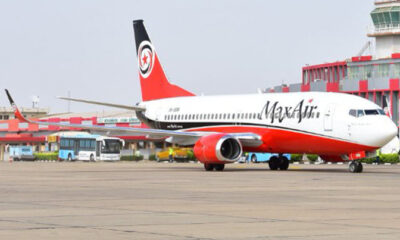Business
NIMASA Seeks Location For N50bn Floating Dock
The Nigerian Maritime Administration and Safety Agency (NIMASA) says it is yet to get a location for the N50 billion floating dock.
Director-General NIMASA, Dr Bashir Jamoh, in an interview with newsmen in Lagos, said no one has started or tested the floating dock since 2018.
He said it took the agency eight months to convince the regulatory authorities to get approval to commence operations of the floating dock in Lagos instead of the Niger-Delta.
“Now, as we are talking, I am just coming back from Abuja to get the consent and agreement of the people that will give us the location where we can place the floating docks.
“Up till now, we have not got a location. And then, the other thing is that it has been there since 2018, nobody has worked on it, started it or tested it. So, we have to bring the engineers several times to come and work on it, including the Isrealis.
“Secondly, on the location, the first thing that came was the issue of going to the Niger-Delta. We discovered that we don’t have the draft; the issue of commercialisation also came to the fore, people don’t have the confidence to go there and so many other things.
“On this alone, we spent eight months convincing the authorities to give us the approval to commence the operation of this floating dock in Lagos”, he said.
A floating dock, floating pier, or floating jetty is a platform or ramp supported by pontoons. It is usually joined to the shore with a gangway.
“The pier is usually held in place by vertical poles referred to as pilings, which are embedded in the seafloor or by anchored cables”, he explained.
The floating dock, which was conceptualised and acquired by the Dakuku Peterside-led administration, was expected to serve as a maintenance base for visiting vessels and those domiciled in the country, with aspirations to save about $100m yearly in capital flight; generate employment, and boost local capacity.
Sadly, the aspirations have become a mirage, owing to improper planning.
The facility, measuring 125 metres by 35 metres, with three in-built cranes, transformers, and a number of ancillary facilities, was built by one of the world’s largest ship-building firms, Damen Shipyards, in collaboration with its partner, National Industrial Research and Development Agency, Amsterdam, the Netherlands, for N50bn.
Speaking on the agency’s plan to collaborate with the Nigerian Ports Authority (NPS) to manage the floating dock, the NIMASA DG said, “We came and saw the modular floating dock belonging to NPA working, with the dolphins standing.
“Today, it is no more. We had a meeting with the NPA and we were contemplating whether the people that managed their floating dock will manage ours. I told them that they killed their own, and that they can’t kill my own, we learned from that particular arrangement, the NIMASA DG explained.
Jamoh said the government had to import dolphins that would be used to clip the floating dock from the Netherlands as they could not be sourced locally.
“For the dolphins that we want to put, you cannot get the equipment that can fit into the dolphins into our own sea in order to clip the floating dock.
“We have to do temporary importation of the equipment from the Netherlands, to come just to put the dolphin and take it back to Netherland” he concluded.
Business
Tinubu’s RHI Doles Out N50m To 1,000 Kwara Petty Traders

Business
UBA To Educate SMEs, Business Owners On Withholding Tax

Business
Nigeria Losing $40b Annually From Maritime Sector – NIMENA
-
Politics5 days ago
Stop Lying About Your Wealth, Odinkalu Knocks Buhari
-
Business5 days ago
CBN Releases FX Code To Mitigate Financial Risks
-

 Editorial5 days ago
Editorial5 days agoNo To Hike In Telecom Tariffs
-

 Featured5 days ago
Featured5 days agoFG Suspends Max Air Operations For Three Months Over Kano Incident
-
Nation5 days ago
Rivers CP Eulogises LG Boss Over Donation Of Vehicles
-
Politics5 days ago
Assembly Declares Lawmaker’s Seat Vacant Over Alleged Absenteeism
-
Business5 days ago
Aviation Stakeholders Raise Alarm Over NCAA Appointment Saga …Harp On Safety
-
Opinion5 days ago
Fubara @ 50: Golden Sparkles And Magic Bullet

